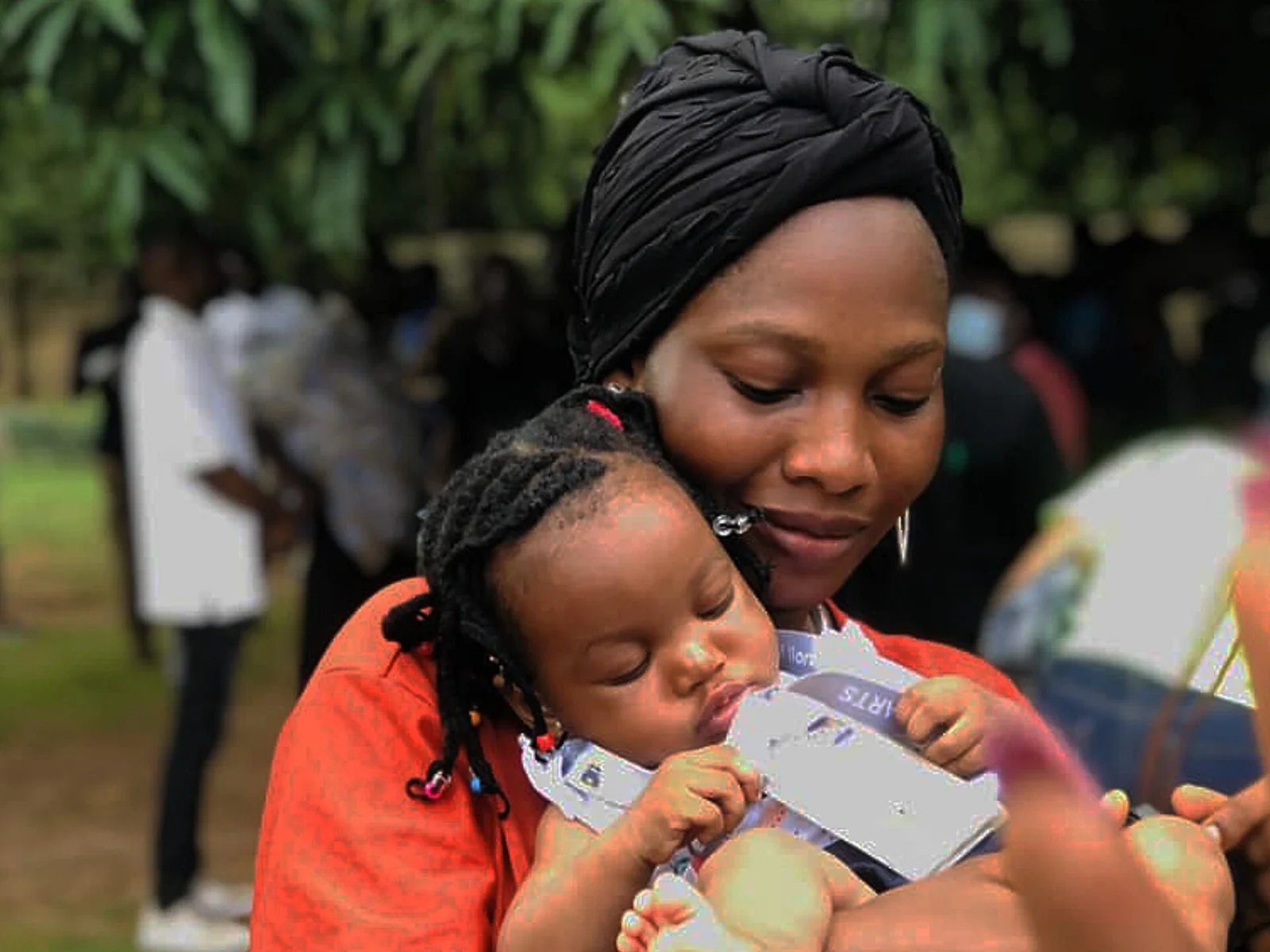
Girl Student – Balancing Motherhood and Education, The story of Halimat, a student Nursing Mother Changing The Narrative

When asked, “How did you become a nursing mother while pursuing your studies?” Halimat responds cheerfully.
Honestly, I don’t even know, it just happened because it wasn’t part of my plans that while I was in school that I am going to be a nursing mother at the same time. It wasn’t in my plan because then when we were still in secondary school, you know the way we used to plan that after secondary school, institution, get a job and get married. So I sha found myself being a nursing mother before the end of my undergraduate. Let me say I fell in love, or I don’t even know.
Imagine a typical day on a Nigerian university campus. You’ve got your lecture halls filled with students humming and booming with furious mixed scents of perfumes and body odours; while some are scribbling their notes, you see a group of students at one corner of the hall obsessively discussing last night’s football match and perhaps another group gossiping about that one lecturer that always wear T-shirt on Buba trouser, and there amidst all of these, you see a student hurrying with a backpack on one shoulder and a diaper bag on the other. Being a student alone is hard; now imagine throwing a baby into the equation, a tiny human being who demands round-the-clock feeding, diaper changes, and a high level of patience. Here is where I say, ‘Welcome to the life of the student nursing mother.’
Three years before Halimat finally got admission into uni, her dream was clear: go to university, study common law, graduate with at least a second-class upper and get a job in one of the Law firms somewhere around Lagos or probably become a SAN-like Chief (Mrs) Folake Solanke, but somehow life happens to her.
This is life, and life happens. People have dreams and plans. Firstly, from the start my goal since secondary school, you know when they ask us, What do you want to become in the future?” Everybody will shout. ‘I want to become a doctor , I want to become a lawyer .’ Before I was in my SS class, I used to dream that one day, I was going to become a doctor, but life happens, circumstances come and things change. Somehow, I find myself in art class, and that changes everything for me. In art class, I found a new dream of becoming a lawyer. So after that, life happens again. After my senior WAEC, I spent three years at home because I couldn’t get admission into the institution immediately after I finished my secondary school education. Even when I later got admission three years later, I applied for common law, but the University gave me History and International Studies. This is what made me finally believe that in this life, you can dream and hope for something but still not get it because life happens. Ever since then, I have never dreamt of becoming anything, just praying only to find myself in higher places.
Things could have been better if Halimat had been admitted to study law because she shared the same dream that every average Nigerian youth could best dream of. Still, one circumstance led to another event that changed Halimat from a dreamer to an escapist or wishful thinker.
Abortion shouldn’t always be the solution
Halimat was already 21 years old and in her third year at uni when she got pregnant to Solihu Muyhideen Olanrewaju, her husband and father of their beautiful daughter, Muyhideen Hanan Oluwatiresimi. It was in 2022, that period when all Nigerian institutions went on that one-year never-ending ASUU strike, around April – May, that she got to know that she was pregnant. But here is the catch: Halimat wasn’t surprised or felt wrong about her pregnancy. She has been praying to God to grant her the grace to be pregnant, and this is what makes the narration of this story a twisted one.
Exactly 1.8 to 2.7 million abortions occur annually in Nigeria. That is 41.1 per 1,000 women who opt for abortion, and according to a report by the World Bank, approximately 19% of Nigerian women aged 15-19 have either given birth or are pregnant with their first child, which contributes to the increasing number of student mothers at the university level.
Halimat, like many other Nigerian youth, could have preferred to opt for termination or a secret abortion at an undercover maternity clinic run by quack doctors out of the prying eyes of the general public. But this is very unsafe, risky and against Nigeria’s abortion law, which states that the only legal avenue for a pregnancy to be terminated is if a woman’s life is critically threatened, but anything beyond that is illegal and comes with a heavy jail term.
The kind of happiness that I felt that day, I was so happy because it was something that I have been expecting. My pregnancy was not a mistake at all. I was so happy and I never thought of abortion.
Societal expectation for women to marry and have children at a young age
But Halimat was so desperately wanting to be pregnant. Before Halimat got pregnant with Olanrewaju, she was already on the verge of getting married to Olanrewaju even though she was just in her third year at university. But as custom demands in their family, when the two parties are ready to give marriage a shot, the future wife is expected to be at least a month pregnant into the marriage, as this is to confirm the fertility of the woman and to avoid any issues relating to barrenness. And when Olanrewaju told her he was ready to take their relationship to the highest stage, Halimat could only hope to get pregnant. It turns out that Halimat was already planning her wedding before she even got pregnant…
My pregnancy wasn’t something I was not expecting. I even prayed that God should let me get pregnant because we’ve already fixed the wedding date. It was even my mom who always call me and pray for me that she wish me quick pregnancy
Halimat believed that the idea of going into marriage wasn’t entirely hers. After she met Olanrewaju in 2019 and started as lovers, the idea was just a boyfriend and girlfriend status. But you know the feelings and self-conviction when you think you’ve finally met the bone of your bone – yes, that kind of feeling.
It wasn’t as if I wanted to get married. It was not my plan. Let me just say what made me agree to my husband’s marriage proposal was because of who he is. When we started off, it was just boyfriend and girlfriend status, but Olarenwaju is a great person and a great man, so He’s the one that changed my mind. As a man that proposes for marriage, he’s someone that cherishes me most, and that convinces me to say yes to him.
Dropping out of school shouldn’t always be an option
In a country like Nigeria, where education is considered a pathway to upward mobility, the dilemma faced by student nursing mothers poses a critical question: should they continue their studies or drop out of school? This decision, seemingly personal, reverberates across societal, economic, and gender equity spheres. The answer is not a simple one, and the issue’s complexity invites a more profound reflection on the choices available to these young women. Should motherhood mark the end of their academic aspirations, or can these two roles – student and mother – coexist without undermining the other?
A report by the United Nations Population Fund (UNFPA) indicates that many young mothers in Nigeria, especially those who become pregnant while in school, are forced to drop out. Around 30-40% of young women who become pregnant while pursuing education either delay or abandon their studies. But this wasn’t the case for Halimat. At this point, Halimat held onto the belief that she had to finish what she already started.
I motivated myself because I believe that I have to finish what I started. I was like no way, I have to finish what I started. Whether it will be easy or not, I have to. And then my mom, she also motivated me too because I felt like I have to make her proud so it won’t feel as if I got married and I dropped out of school. But because of what she has been through for me, I have to make her proud of me, even though I am married, I made sure I obtained my first degree certificate.
It wasn’t just about Halimat; it turns out that Olarenwaju was Hamlet’s biggest support system. The motivation to continue schooling as a mother wasn’t just about her self-determination but, of course, because of her husband, who was always there with her.
My husband too was like he wouldn’t like it for me to be a dropout because we got married. My husband motivated me to continue with my studies and finish what I started, and not just finish because I have to finish my studies, but he made me realize that I have to maintain my GPA and come out with flying colors. My husband will always tell me that Ope! I trust you, you can do it. Have determination and dedication”, and I thank God that everything went well.
The challenges of a student nursing mother
Halimat, just like everyone else, would very much also think about the challenges of being a student and, at the same time, a mother might be very tasking and demanding, but yet, what about the consequences that come with abandoning her education? Should she sacrifice her dreams of academic achievement on the altar of motherhood? What about the open door to better career prospects, higher earnings, and self-sufficiency? Compared to dropping out of school because of motherhood, that might later trap her in a cycle of poverty and dependence. Considering all of these, it might be worth taking the challenge – be a student and a mother at the same time. But it still doesn’t take away the reality of student nursing mother syndrome and challenges.
It wasn’t an easy journey for Halimat, as she described it; it was hard for her to cope with the challenges. But as time passed, she soon realised it would be possible, and at every breaking point, Olarenwaju was always there for her.
It wasn’t an easy journey though. Seriously, I faced so many challenges such as time-management, asin to manage my time for studying and then attending to home chores, I have to take care of my baby girl, my husband and again self-care because for me, to have time for myself wasn’t easy. Sometimes, my husband will just tell me to just go and relax and then I can come back to attend to whatever I want to do.
I really lack self-care, because for me to relax, it was not easy. There are times that my husband will tell me to just go to sleep, and when I wake up back, I can come back later to attend whatever I want to do. Even while sleeping, I will be thinking in my head about what I left that when I wake up ooo I want to do this, I want to do that. When it even gets to some point, I won’t lie to you, I develop high blood pressure because of lack of rest, I am not resting too well, I develop high blood pressure. Sometimes, my baby will just start crying for no reason and someone won’t be able to rest. Aside from that, going for 8:00 am classes.
Becoming a first-time mom changed Hamlet’s perspective on everything, ensuring that she got everything done on time, from getting school work done correctly and on time to making sure that she scheduled herself for house chores and taking care of her baby at the same time. However, things were a little bit easier with the presence of her sister-in-law, who was staying with them to help carry the baby, making it easier on one part while doing anything in the house or studying.
She helps most of the time to play with my baby, and whenever I am attending classes, she stays with the baby while I am in school.
Stigmatisation by student nursing mothers within the educational settings is a big challenge, but luckily enough, Halimat never experiences any form of stigmatisation or alienation from her peers in uni. Based on her account, she described how she was treated with utmost respect by her professors.
No, no one has ever treated me inferior despite knowing I am a mother.For instance, my supervisor Prof Odeh treated me special and with respect. When he knows that I am married and also a mom, I don’t know why but the moment he knows, I feel being treated special and most times our pleasantries are based on how my family is doing.
Where is the University Support System?
But not all wounds get healed. In 2023, Halimat recounted one of her most unforgettable experiences as a student nursing mother. To Halimat, it was the moment that made her feel inadequate as a student nursing mother for the first time.
During our field trip, I went to meet my level adviser, Mr. Danlad Yusuf to explain my situation. I am a nursing mother and I won’t be able to go for the field trip because of my baby. His response was that there’s nothing he can do about it. I even told him that I will pay the trip fee if that is what he’s worried about. I explained to him to allow me because of my baby, but he said No, unless I am going to wait till the next set which means an extra year for me. I felt so bad when he said that to me. I was like why won’t I be going with my mate, but if that is the case, I will just have to carry her with me then. I felt so pitiful for my baby then because of the stress that she is going through. But I don’t have any other choice than to go with her. It was an experience that made me feel bad as a student nursing mother for the first time, but later sha, things turned out different. During the trip, my colleagues showed me love, showed me kindness and that made me relieved and relaxed.
Jokes aside, if I were to be in Halimat’s shoes, knowing fully that the Nigerian university system has no support system in place for a student nursing mother like her, maybe I might just have to give up on schooling or kiss goodbye to keeping the pregnancy.
To address the challenges faced by student nursing mothers, universities in Nigeria need to adopt some comprehensive policies that would cater for the specific needs of student nursing mothers. On childcare, Nigerian institutions should provide on-campus childcare facilities to ease the burden of managing academic and parental responsibilities. This would not only help student mothers concentrate on their studies but also provide a safe and conducive environment for their children.
Nigerian universities should also try to introduce flexible academic policies that accommodate the unique circumstances of student mothers. These could include more lenient attendance policies, the option to defer coursework or examinations during particularly challenging times, and provisions for remote or hybrid learning to accommodate mothers who may not always be able to attend classes in person.
Regarding how motherhood has affected her academic activities and performance, Halimat did not hold back her lamentation on how becoming a student nursing mother affected her.
Yes actually, it had effects on me on many occasions. Going to 8:00 am classes was really stressful, but I made sure I tried my best so that it wouldn’t affect me too much. Although, I couldn’t participate in some activities. I tried all my possible best to meet up with assignment deadlines and also get help with doing my assignment, but my situation did not change my focus at all.
Only a handful of Nigerian universities have programs or policies that specifically cater to the needs of nursing mothers. For instance, Obafemi Awolowo University (OAU) and a few others have established daycare centres, but most Nigerian institutions lack such services. This gap in support remains a major challenge for nursing mothers who wish to continue their education. Universities must step up to the plate and provide the resources nursing students like Halimat need to succeed. On-campus childcare facilities, flexible class schedules, and mental health support would go a long way in easing their burdens.
My Final Submission
If there’s anything I have come to learn so far from the Halimat story, it is that becoming a mother or becoming a student nursing mother is not the end of everything. The Halimat story indicates that it is time to shift the narrative. Rather than asking whether student nursing mothers should drop out, we should ask why they are being forced to choose in the first place. Shouldn’t we, as a society, ensure that all students-mothers included, have the opportunity to succeed?
In my final analysis, student nursing mothers face a decision that no one should have to make. Dropping out of school may seem more effortless in the short term, but it’s just a temporary escape from a problem still waiting for them. If we want more women to succeed, we must stop treating motherhood as a barrier to education and start recognising it for what it truly is – a motivator.
Read More:
- Chad Threatens Withdrawal from Multinational Joint Task Force Over Ineffectiveness Against Insurgents
- Niger Signs Deal With Russian Firm To Acquire 3 Satellites To Boost Sahel Security
About The Author
Bankole Taiwo James
author
Journalist | Ex-Columnist @nigeriantribune | Columnist @narionaldailyng | Opinion and Contributing Writer @Sahara Reporters
Bankole Taiwo James
Journalist | Ex-Columnist @nigeriantribune | Columnist @narionaldailyng | Opinion and Contributing Writer @Sahara Reporters
Related Articles
Oxford English Dictionary Adds Nigerian Words Reflecting Global Culture
The Oxford English Dictionary has added a range of Nigerian words and...
ByWest Africa WeeklyJanuary 8, 2026Niger State Approves School Reopening Following Security Review
The Niger State government has approved the reopening of schools across selected...
ByWest Africa WeeklyJanuary 3, 2026Nigeria’s New SS3 Ban Punishes Students for a Broken Education System
The Federal Government has announced a ban on the admission and transfer...
ByWest Africa WeeklyDecember 15, 2025Nigeria Ends Mother-Tongue Instruction, Adopts English-Only Policy in Schools
The Federal Government has formally scrapped the mother-tongue-based teaching policy introduced in...
ByWest Africa WeeklyNovember 14, 2025












Leave a comment